Johann Georg Faust was an astrologer, alchemist and magician who is said to have lived during the German Renaissance. The enigmatic nature of this man and the many legends about his person make it difficult to separate fact from fiction and also legend from history. Possibly Faust was a con man who pretended he could perform miracles (similar to the miracles of one Jesus). It is more than likely that Faust could not actually perform real miracles like alchemy, but toured Germany while performing magic acts and reading horoscopes. His alleged popularity and fraudulent claims attracted the negative attention of the Catholic Church. The church denounced Faust as a blasphemer who was in league with the devil… Perhaps the Catholic Church also wasn’t a fan because Faust due to his protestant tendencies. Faust was, according to the Church, allegedly guilty of fraud, dark magic, alchemy and even necromancy and sodomy, amongst other things. During an alchemist accident, Faust is said to have blown himself up, but it was suspected that he made a deal with the devil for his miraculous gifts and that the devil claimed his corrupted soul taking Faust resulting in the blast.
In most legends about the erudite Faust, he is a successful man but dissatisfied with his mundane unexceptional (for his standards most likely) and mortal life, which leads him to make a deal with the Devil. Faust exchanges his soul for unlimited knowledge and riches of worldly pleasures. The legend of Faust is the basis for many literary, artistic, cinematic and musical works that have reinterpreted the legend’s main character. “Faust” and the adjective “Faustian” are therefore a literary synonym for sacrificing spiritual values (or one’s soul) for power, knowledge or material gain. Think of “selling your soul” (as in: not living by your principles) for a high-earning job in the corporate world. Probably the most important work reinterpreting Faust is playwright Johann Wolfgang von Goethe’s tragic play that subsequently inspired a very well-known opera, film adaptations and even a rock musical. In the complex and multi-part play, Mephistopheles (the devil’s interpretation according to German folklore) makes a bet with God that he can seduce the benevolent Faust to his side. A well-known part of this play is the depiction and representation of Walpurgisnacht: a Germanic, pagan holiday where evil souls are said to have free rein. ‘Making a deal with the devil’ is a recurring motif in many literary and artistic works.
On an unrelated note… ‘Deal with the Devil’ is also the title of a highly thematically and appropriately complex and layered game published by Czech Games Edition. Your soul in exchange for riches: will you take on this Faustian deal?
Goal and setup
The player who manages to score the most points at the end of Deal with the Devil, by constructing buildings, collecting resources and taking actions, wins the game. How does a player earns points depends on the player’s role. Each player assumes the role of the ruler of a kingdom, but these rulers try to increase their kingdom’s wealth in immoral ways. Two players are mortals, one player is already taken in with evil and one is the devil himself. These four roles are hidden. At the start of the game, players set out all the varied components. On the centre of the table, players place the central game board and the action rondel. Players each sit on one side of the game board. Next to the game board the game board with the reputation track, points track and the overview of the different inquisition rounds is placed. Each player gets a castle wall, a floor with an action track and a removable roof. Behind their wall, players can hide their resources and information about their roles. Behind the roof, players can keep their planning hidden during the action phase. During Deal with the Devil, information is secret AND very precious.
Each player is assigned a role at the beginning of a game. Each role has a corresponding treasure chest. The different treasure chests already contain some ’trade goods’. The mortals start with three pieces of soul, the cultist starts with several resources and two tainted pieces of soul and the devil starts with a plethora of riches. Evil ways evil pays. The accompanying app secretly distributes the treasure chests to the different players. The app keeps track of roles.
Gameplay
In five different rounds, players go through a number of phases simultaneously. Not all phases are played in every round, but both the game board and the app clearly explain which phases are played and exactly when. In any case, the different game components all indicate, with clear symbolism, how the game should be run and played. When the rondel on the game board slides through, all relevant information is revealed for that specific round. Most of the boards and pieces are double-sided so that the components stay in the right places, and players’ castles depict a clear set of information. Each player is given a sheet with information on all phases and the different steps to be taken per phase.
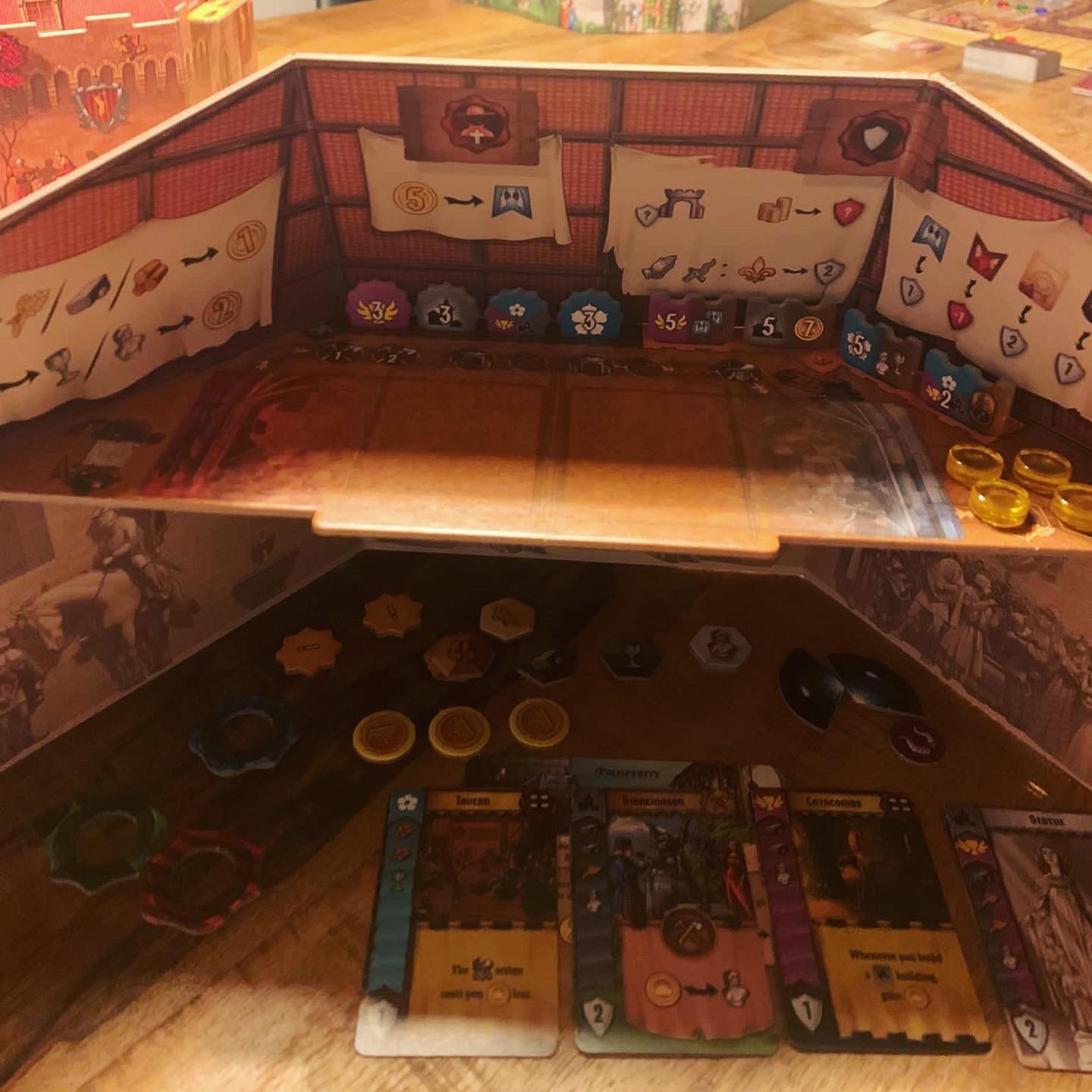
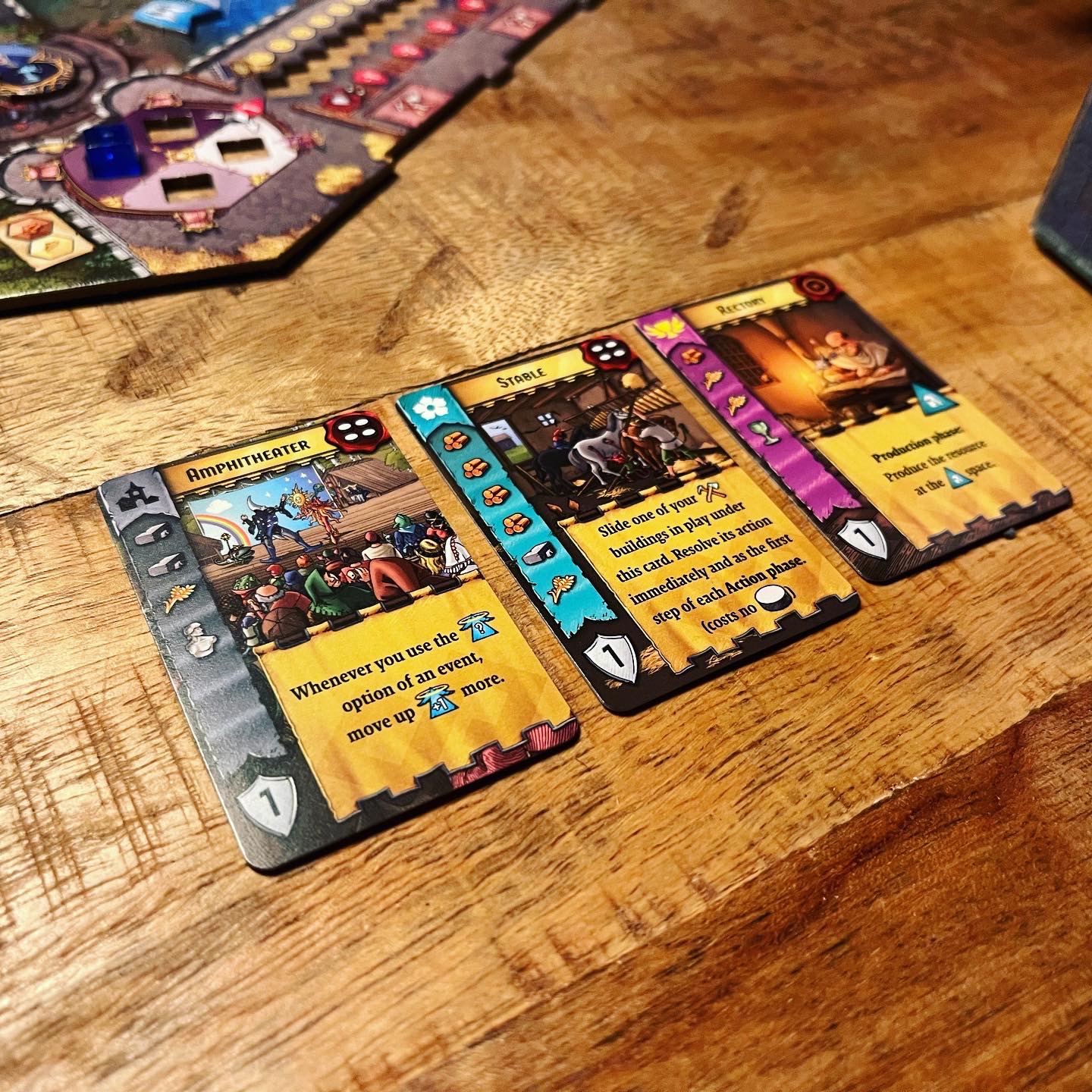
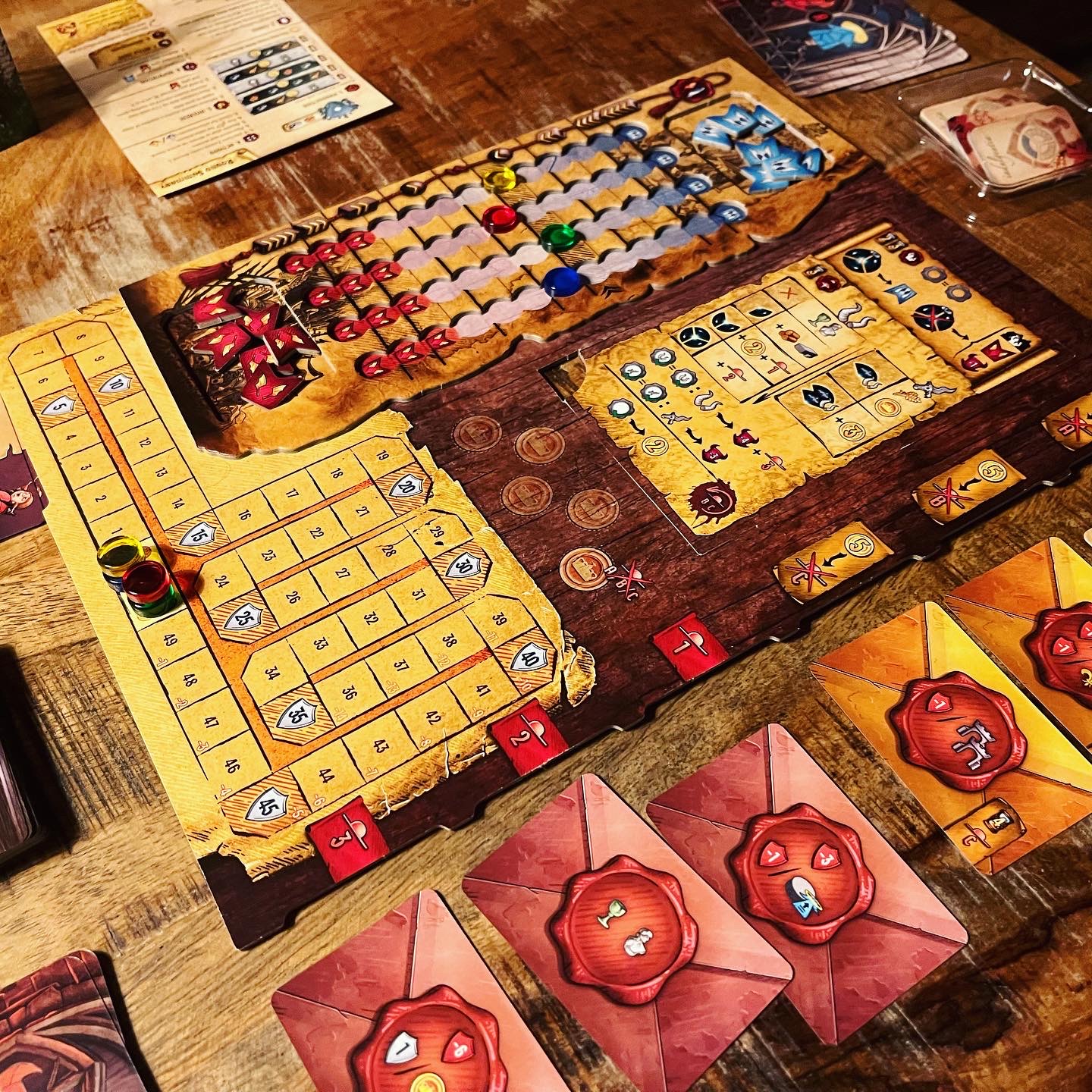
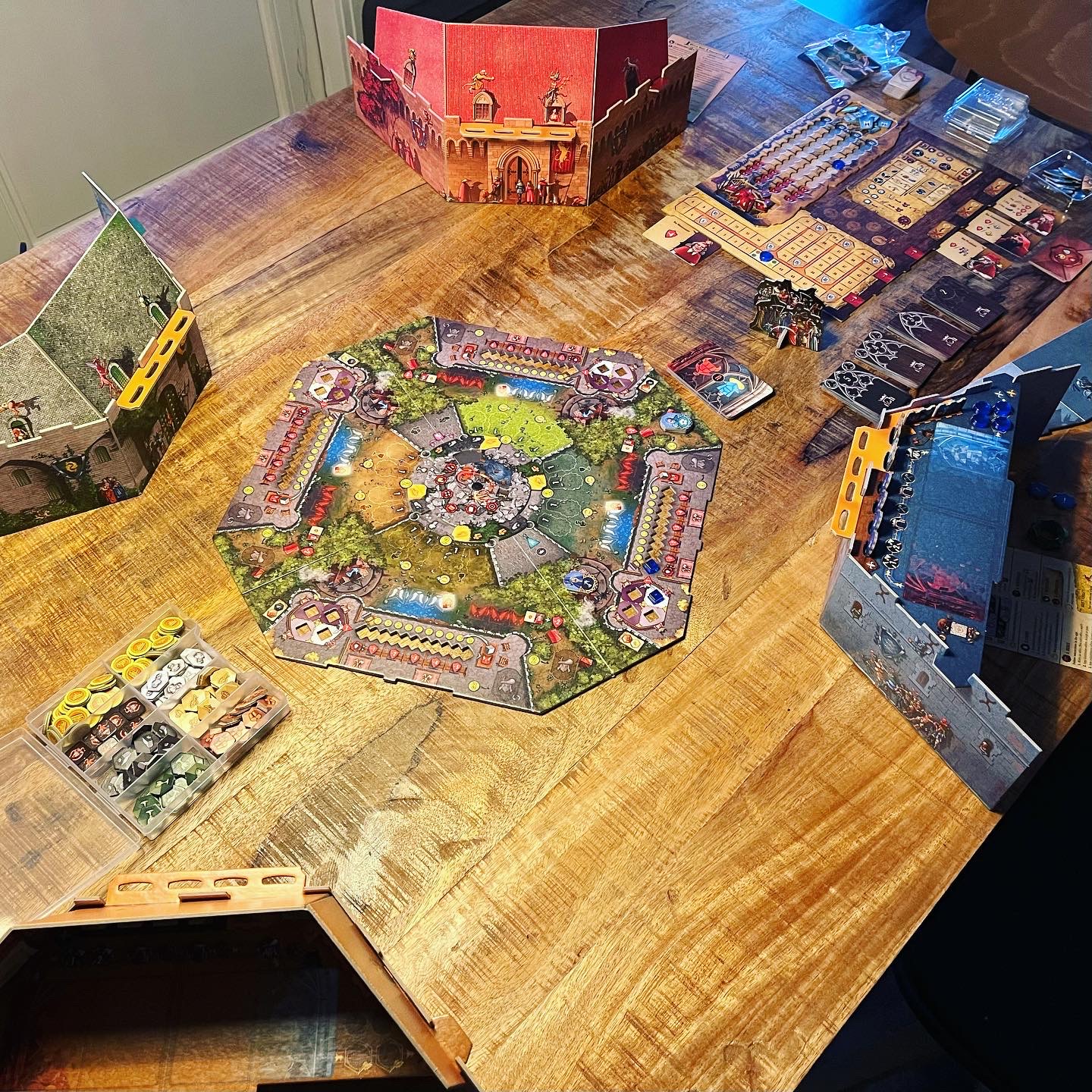
Deal with the Devil is a game with diverse and distinct gameplay elements. As a result, the game explanation may take a long time, as there is a lot of (new) information coming at players. As the roles need to stay hidden the attention span of player’s must be taken into account as asking certain questions may give away your secret role. Because of this, I will also not describe every phase or game concept in close detail. Although players get subjected to a lot of new information, the game structure and progression is quite clear actually.
Players start each round with a production phase. During this phase, they get new resources and money with which they can deal with other players and perform actions such as developing buildings. In the cards phase, players receive new building cards and event cards that they can use during the action phase. In the deal phase, players start by placing goods in their chests. Mortals can demand money for resources, the cultist (in addition to money) and devil can demand pieces of soul in exchange of other goods. In this phase, the app distributes the treasure chests, after shuffling them to scan them, to the different players so that everyone’s roles remain hidden. In the action phase, players can spend their acquired resources and money to buy event cards, building cards and courtiers. Buildings earn bonuses, as well as points at the end of the game. During the game, certain actions can cause players’ reputations to rise or fall. In the reputation phase, players with high or low reputations respectively receive angel wings in the hope of possibly buying indulgences or demon wings after which the church might send a personal inquisitor to a player’s kingdom.
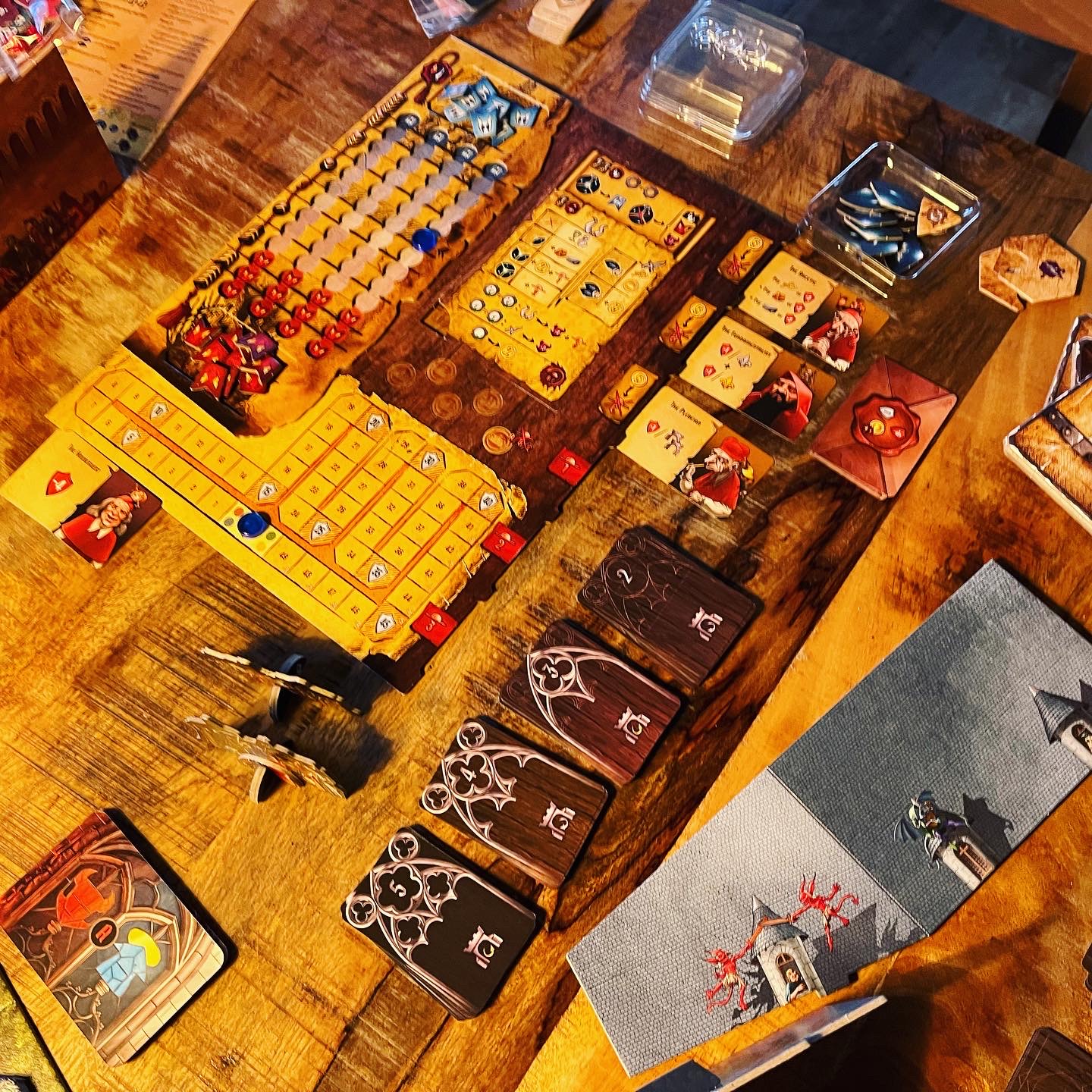
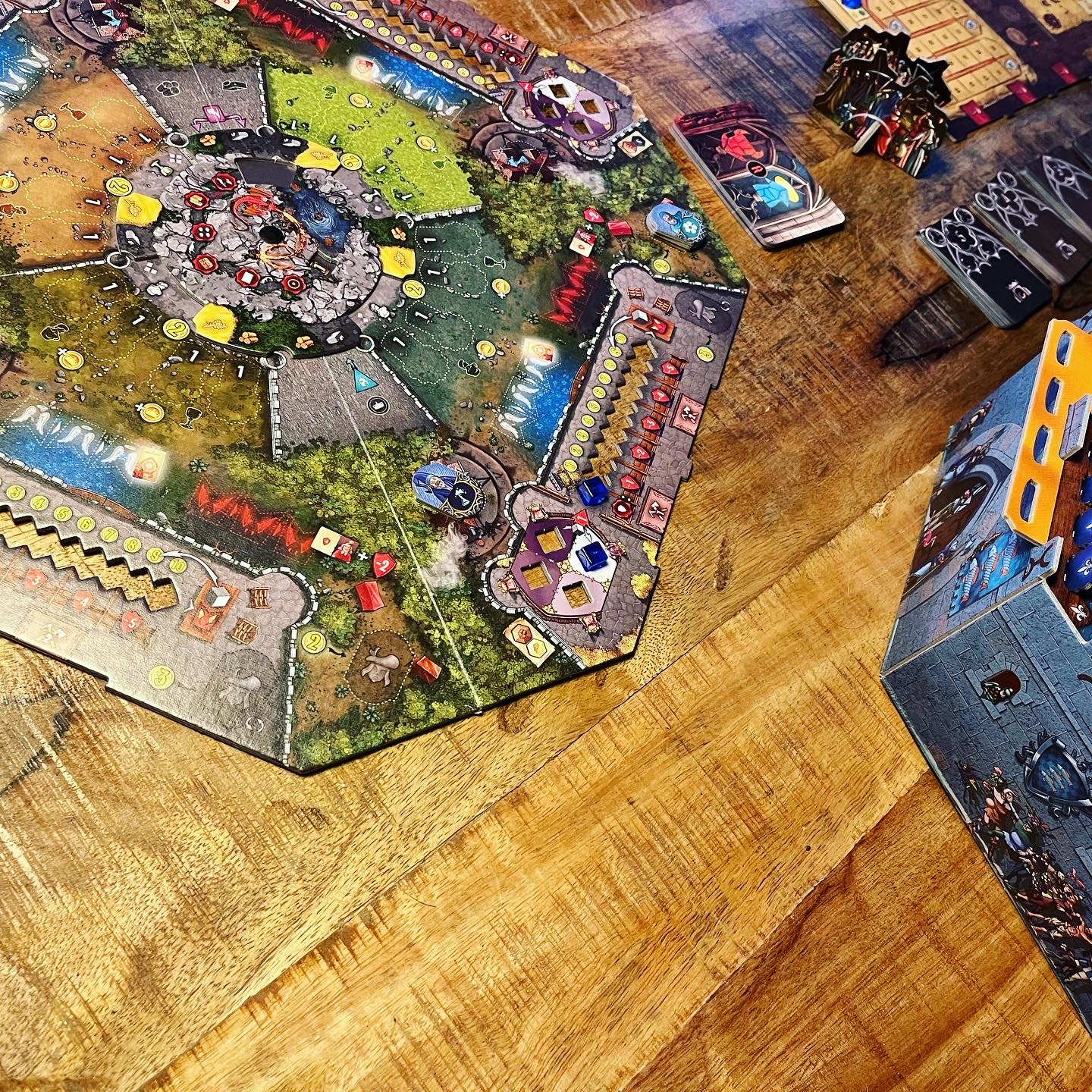
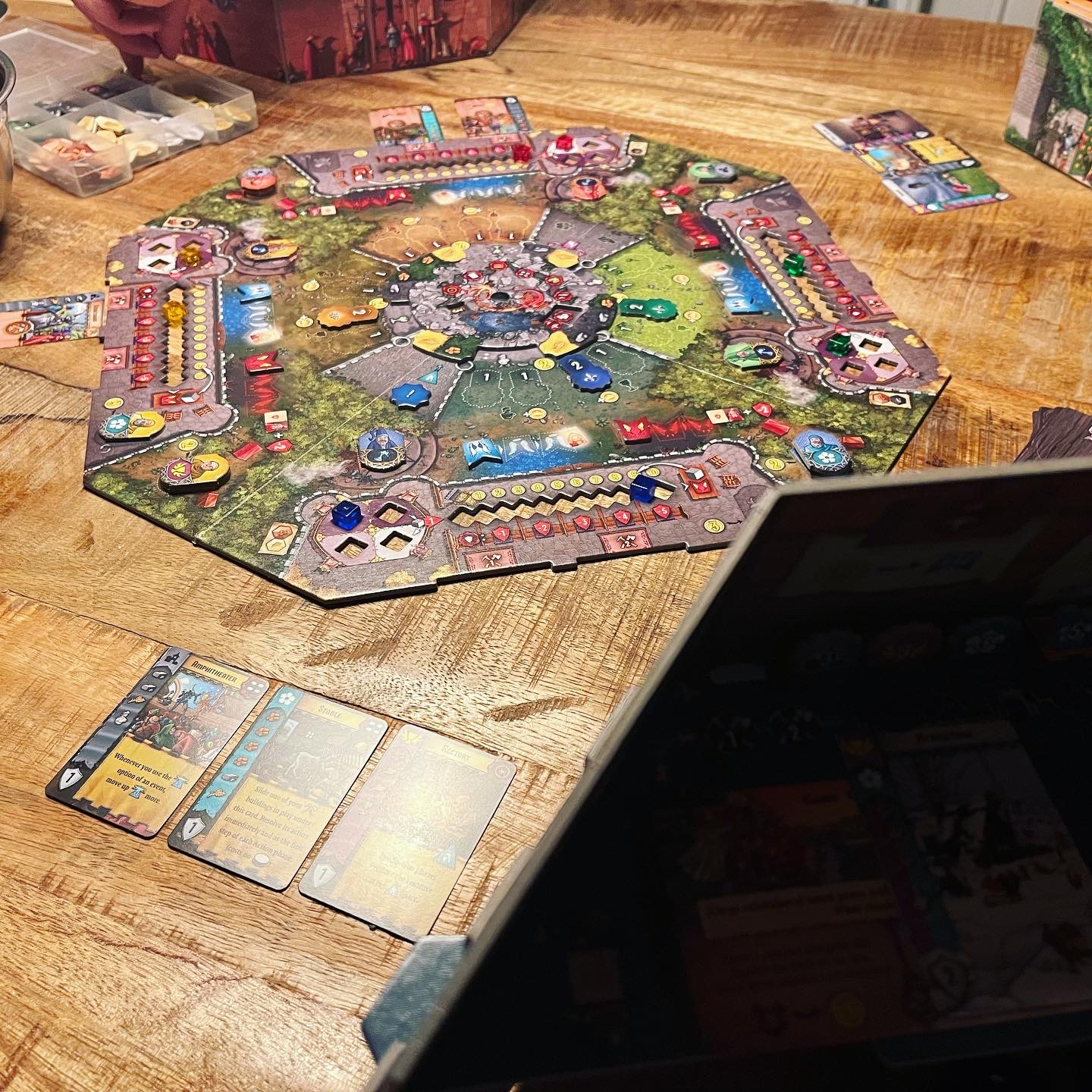
In some rounds of play, a witch hunt takes place. During this phase, players can simultaneously vote for the player they suspect does not possess three pieces of soul (anymore). This is a disgrace and if a player is designated with a majority, that player may lose a lot of reputation with the church if it turns out that this player has engaged in diabolical witchcraft. In some rounds, a dark ritual and an investigation by the Inquisition takes place. In this phase, the player will see just how many souls the devil has acquired up until that point in the game. There are also several inquisitors who trigger negative effects if players cannot show enough pieces of souls and/or indulgences. After all, good behaviour can be bought off. Speaking of playing someone off: fortunately, the inquisition can be bribed.
Verdict
Deal with the Devil and its game mechanics overflow with details and rich thematics. The theme is wonderfully implemented and in a very humorous way. The mindset of religious authorities in the Middle Ages is parodied in apt and humorous ways. Because of this, the theme is not for everyone, but personally I am a huge fan because the theme oozes from every aspect of the game. The rules of the game are a nice read, partly because of the humour in the rulebook. As I mentioned earlier, there is a lot of new information being fired at players, but the game and structure are clear and intuitive through the use of symbolism and the app (which, by the way, does not get in the way of any enjoyment). It is a complex game and aimed at experienced players. The combination between a heavy Euro title (where players move resources around in clear stages to trigger complex actions) combined with a game with hidden roles is intriguing, but it works tremendously well. Because of the asymmetry between roles and the complex nature, the game is only playable with four characters. This is not a downside, but a point of attention for players who find it difficult to regularly get a four-player group together. So for me, no devil’s dilemma, as Deal with the Devil is highly recommended – but especially for gaming groups that like more complex games, with a distinctive theme and full of devilish twists.




